After March’s challenging weather, it’s easy to forget that silage season is now just around the corner.
Delayed fertiliser-spreading in many parts of the country will likely result in early-cuts clashing with late-cuts, and therefore creates an increased workload for contractors.
Downtime needs to be avoided at all costs, so preseason maintenance is essential, regardless of the machine.
Here we offer some pointers for getting a combination baler/wrapper ready to chop and roll. Although this article focuses mainly on a McHale Fusion, many of the points will be applicable to other brands.
Remember, safety should be prioritised at all times and if in doubt, it’s best advised to contact your local dealer.
So firstly, the tractor should be turned off and the key removed. When working in round areas, such as the bale chamber, the hydraulic tap should be locked off to prevent any loss of pressure causing the door to close unexpectedly.
Pickup
In order for the baler to work anywhere close to its potential, the pickup reel needs to be maintained to a high standard so it can gather grass cleanly and efficiently.
Being a component often subject to abuse and challenging conditions, the pickup reel needs to be gone through in depth before the machine is put to work.
The cam bearings (if fitted), located on the tine bar ends, should be replaced at the beginning of each season.
The cam track should also be inspected for wear. If one bearing is showing signs of wear, replace the full set for peace of mind. Any broken or damaged tines should be replaced, as missing tines will put more of a strain on the existing tines. It’s also important that all bands are attached.
The scroll pins on the tine-bar’s ends should be replaced at the beginning of each season to keep the pickup nice and tight. The plastic bushings at the centre of the pickup should also be replaced. It’s important that the two carrier bearings on the centre shaft are greased.
Bearings in the small wheels that the reel runs on should be inspected and replaced, if necessary. McHale advises that operators should replace the drive-side gearbox bearing after every 25,000 bales. It’s also good practice to change the oil in the gearbox each season. It takes two litres of 80/90 oil.
The auger and rotor bearings should be checked over for any play. McHale uses a double roller bearing on the rotor, which should be good to last 60,000 to 70,000 bales.
Knives
Ideally, a new set of knives should be fitted to a baler at the start of every season. However, this will depend on how much work the machine is doing.
It’s advised that the knives should be removed regularly and sharpened professionally using a grindstone.
This method is far better for longevity of the knives and a safer method compared to sharpening using an angle grinder.

Knives should be sharpened regularly, using a grindstone, not an angle grinder.
It is good practice to carry spare knives in case one or more gets damaged or broken in the event of hitting a foreign object.
While checking around the knife bank, all roll pins need to be examined. These roll pins hold the knife forward in a chopping position. Replacement roll pins cost a couple of euros at most.
Chains and rollers
The McHale Fusion has 10 chains, all of which should be checked on a regular basis. If needs be, these are easily adjusted using the tensioners.
It will be evident when chains are coming to the end of their lifespan, as the tensioners will be at the maximum and the chains will start to slacken more and more before they eventually break.
Once the baler hits around the 20,000 to 25,000 bale count, it is advised to replace the full set of chains. Otherwise, these chains will begin to break one by one, leading to unwanted downtime during busy periods.

Chain wear and tension should be examined.
McHale recommends buying the full box of chains, which are cut to the correct length, rather than cutting them yourself.
This is down to chains of the wrong size damaging sprockets – and so costing more in the long run.
The wear-strip that the chain runs on and the idler bearings on the tensioners should be examined.
The rollers and bearings should be checked over for play or movement. Rollers should also be checked for any cracks or splitting.
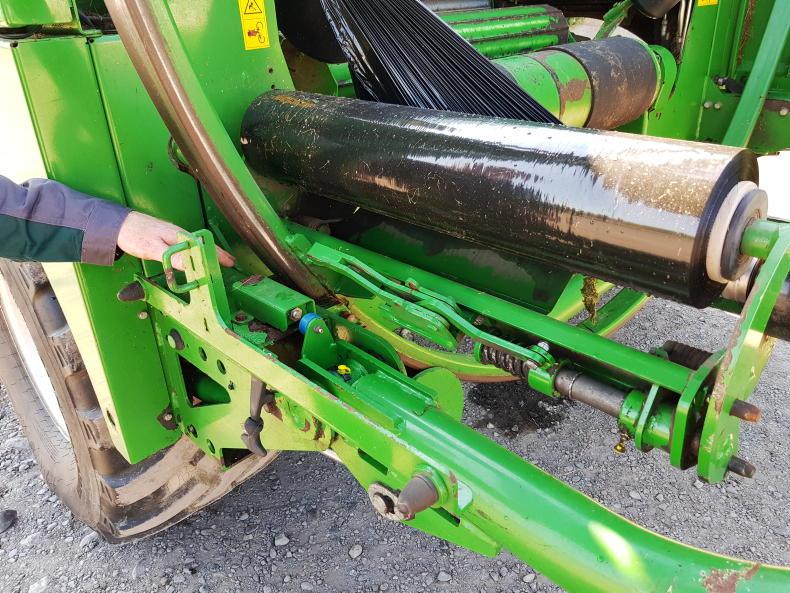
All of the rollers on the wrap dispensers should be cleaned and oiled.
Damaged rollers should be replaced before the season.
It is good practice to run the baler for a short period to double-check that the auto-greasing unit is working correctly.
Binding unit
At the beginning of the season, the netting unit may require some maintenance around the erring wheel.
Once freed up and running at the start of the season, it should be fine.
The erring on the wheel should be kept nice and rough.
If it’s gone smooth, an erring could be missing and will need to be replaced.
The cutting knife should be clean and free from any rust. A quick rub of a wire brush should freshen it up.
If the Fusion is equipped with a film binding option, there will be a small oil reservoir on the right side of the baler.
This reservoir should be checked and kept topped-up with a high quality hydraulic 46 oil.
Wrapping unit
The wrapper unit doesn’t require much maintenance.
The break-pad unit for the ring should be inspected at the beginning of every season. If this is done, it should be perfect for the full season.
All of the rollers on the wrap dispensers should be kept cleaned and oiled.
Rams should be greased on a regular basis, as should all grease points.
The two cut-and-tie units can be easily taken out and cleaned, and should be taken out every year at the beginning of the season.
It’s only a matter of opening one bolt and sliding them out by hand, then cleaning and oiling them.
The blades can be changed very easily too, if required.

Chain-oilers and auto-greasers should be working correctly, ensuring that enough lubricant is being delivered.
It’s important from a safety perspective that the PTO shaft has a good functional cover.
Grease points should be easily accessible without removing the cover. All hydraulic hoses and fittings should be checked over, as well as all lights.
Brakes should be checked at least twice a year and adjusted if necessary.
Wheel studs must be checked and tightened if required too.
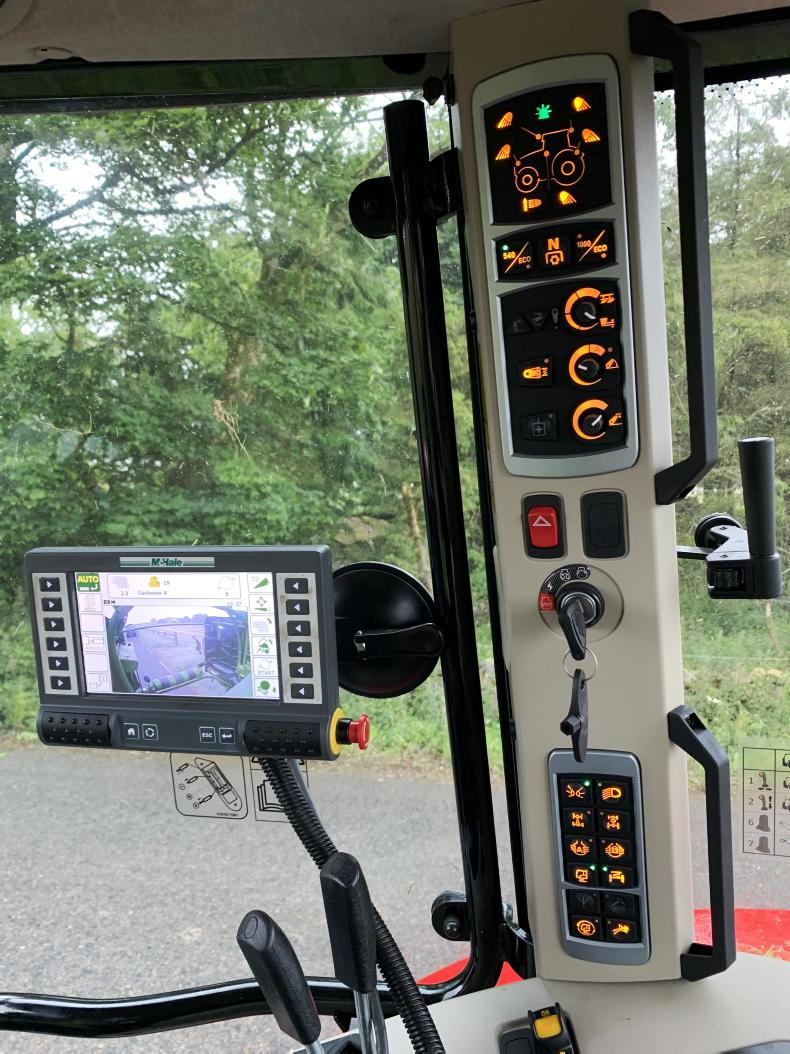
The in-cab terminal should be mounted securely with a good power connection.
The control box should be mounted securely on a bracket in the cab. The wiring loom and connectors should be kept free of any dust, dirt or moisture.
The baler should be clean before doing any repairs or maintenance inspections. Not only will it leave the job dirtier, but dirt could cause a crack or potential damage to be missed.
The baler should be cleaned down daily during the season, otherwise grass build-up may pose a fire hazard.
Sensors and valve chests should be free from dirt. Air compressors are clean, handy tools for the clean-down procedure.
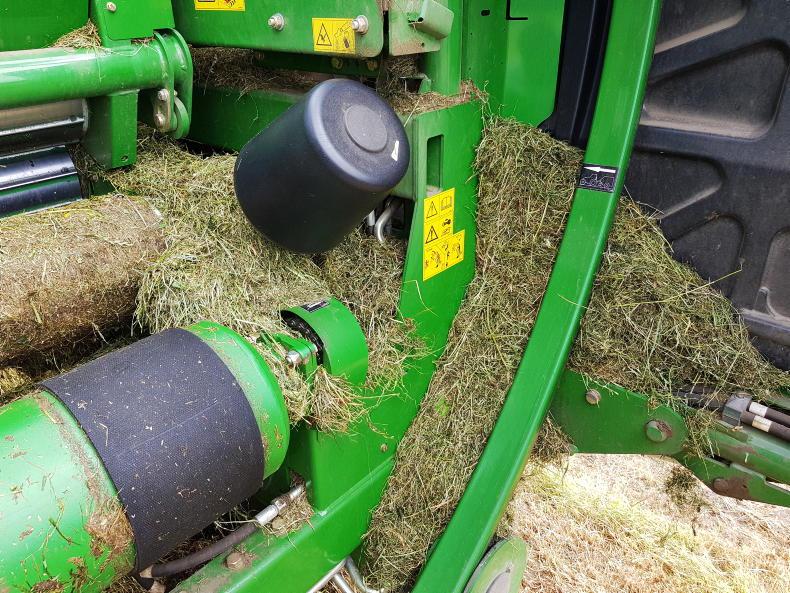
Any build-up of grass should be cleaned down daily.
After March’s challenging weather, it’s easy to forget that silage season is now just around the corner.
Delayed fertiliser-spreading in many parts of the country will likely result in early-cuts clashing with late-cuts, and therefore creates an increased workload for contractors.
Downtime needs to be avoided at all costs, so preseason maintenance is essential, regardless of the machine.
Here we offer some pointers for getting a combination baler/wrapper ready to chop and roll. Although this article focuses mainly on a McHale Fusion, many of the points will be applicable to other brands.
Remember, safety should be prioritised at all times and if in doubt, it’s best advised to contact your local dealer.
So firstly, the tractor should be turned off and the key removed. When working in round areas, such as the bale chamber, the hydraulic tap should be locked off to prevent any loss of pressure causing the door to close unexpectedly.
Pickup
In order for the baler to work anywhere close to its potential, the pickup reel needs to be maintained to a high standard so it can gather grass cleanly and efficiently.
Being a component often subject to abuse and challenging conditions, the pickup reel needs to be gone through in depth before the machine is put to work.
The cam bearings (if fitted), located on the tine bar ends, should be replaced at the beginning of each season.
The cam track should also be inspected for wear. If one bearing is showing signs of wear, replace the full set for peace of mind. Any broken or damaged tines should be replaced, as missing tines will put more of a strain on the existing tines. It’s also important that all bands are attached.
The scroll pins on the tine-bar’s ends should be replaced at the beginning of each season to keep the pickup nice and tight. The plastic bushings at the centre of the pickup should also be replaced. It’s important that the two carrier bearings on the centre shaft are greased.
Bearings in the small wheels that the reel runs on should be inspected and replaced, if necessary. McHale advises that operators should replace the drive-side gearbox bearing after every 25,000 bales. It’s also good practice to change the oil in the gearbox each season. It takes two litres of 80/90 oil.
The auger and rotor bearings should be checked over for any play. McHale uses a double roller bearing on the rotor, which should be good to last 60,000 to 70,000 bales.
Knives
Ideally, a new set of knives should be fitted to a baler at the start of every season. However, this will depend on how much work the machine is doing.
It’s advised that the knives should be removed regularly and sharpened professionally using a grindstone.
This method is far better for longevity of the knives and a safer method compared to sharpening using an angle grinder.

Knives should be sharpened regularly, using a grindstone, not an angle grinder.
It is good practice to carry spare knives in case one or more gets damaged or broken in the event of hitting a foreign object.
While checking around the knife bank, all roll pins need to be examined. These roll pins hold the knife forward in a chopping position. Replacement roll pins cost a couple of euros at most.
Chains and rollers
The McHale Fusion has 10 chains, all of which should be checked on a regular basis. If needs be, these are easily adjusted using the tensioners.
It will be evident when chains are coming to the end of their lifespan, as the tensioners will be at the maximum and the chains will start to slacken more and more before they eventually break.
Once the baler hits around the 20,000 to 25,000 bale count, it is advised to replace the full set of chains. Otherwise, these chains will begin to break one by one, leading to unwanted downtime during busy periods.

Chain wear and tension should be examined.
McHale recommends buying the full box of chains, which are cut to the correct length, rather than cutting them yourself.
This is down to chains of the wrong size damaging sprockets – and so costing more in the long run.
The wear-strip that the chain runs on and the idler bearings on the tensioners should be examined.
The rollers and bearings should be checked over for play or movement. Rollers should also be checked for any cracks or splitting.

All of the rollers on the wrap dispensers should be cleaned and oiled.
Damaged rollers should be replaced before the season.
It is good practice to run the baler for a short period to double-check that the auto-greasing unit is working correctly.
Binding unit
At the beginning of the season, the netting unit may require some maintenance around the erring wheel.
Once freed up and running at the start of the season, it should be fine.
The erring on the wheel should be kept nice and rough.
If it’s gone smooth, an erring could be missing and will need to be replaced.
The cutting knife should be clean and free from any rust. A quick rub of a wire brush should freshen it up.
If the Fusion is equipped with a film binding option, there will be a small oil reservoir on the right side of the baler.
This reservoir should be checked and kept topped-up with a high quality hydraulic 46 oil.
Wrapping unit
The wrapper unit doesn’t require much maintenance.
The break-pad unit for the ring should be inspected at the beginning of every season. If this is done, it should be perfect for the full season.
All of the rollers on the wrap dispensers should be kept cleaned and oiled.
Rams should be greased on a regular basis, as should all grease points.
The two cut-and-tie units can be easily taken out and cleaned, and should be taken out every year at the beginning of the season.
It’s only a matter of opening one bolt and sliding them out by hand, then cleaning and oiling them.
The blades can be changed very easily too, if required.

Chain-oilers and auto-greasers should be working correctly, ensuring that enough lubricant is being delivered.
It’s important from a safety perspective that the PTO shaft has a good functional cover.
Grease points should be easily accessible without removing the cover. All hydraulic hoses and fittings should be checked over, as well as all lights.
Brakes should be checked at least twice a year and adjusted if necessary.
Wheel studs must be checked and tightened if required too.

The in-cab terminal should be mounted securely with a good power connection.
The control box should be mounted securely on a bracket in the cab. The wiring loom and connectors should be kept free of any dust, dirt or moisture.
The baler should be clean before doing any repairs or maintenance inspections. Not only will it leave the job dirtier, but dirt could cause a crack or potential damage to be missed.
The baler should be cleaned down daily during the season, otherwise grass build-up may pose a fire hazard.
Sensors and valve chests should be free from dirt. Air compressors are clean, handy tools for the clean-down procedure.

Any build-up of grass should be cleaned down daily.











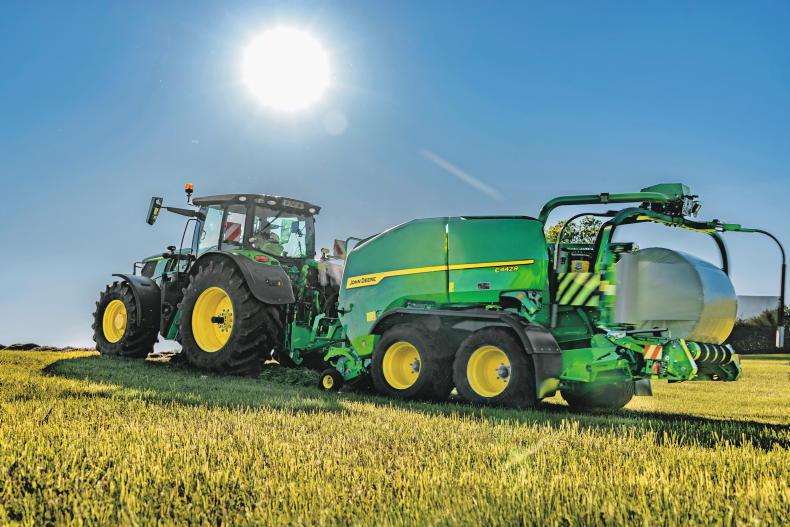

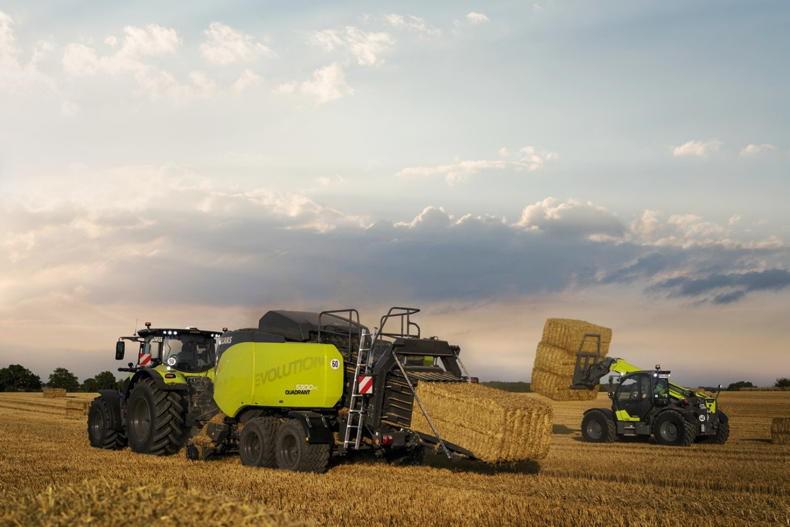

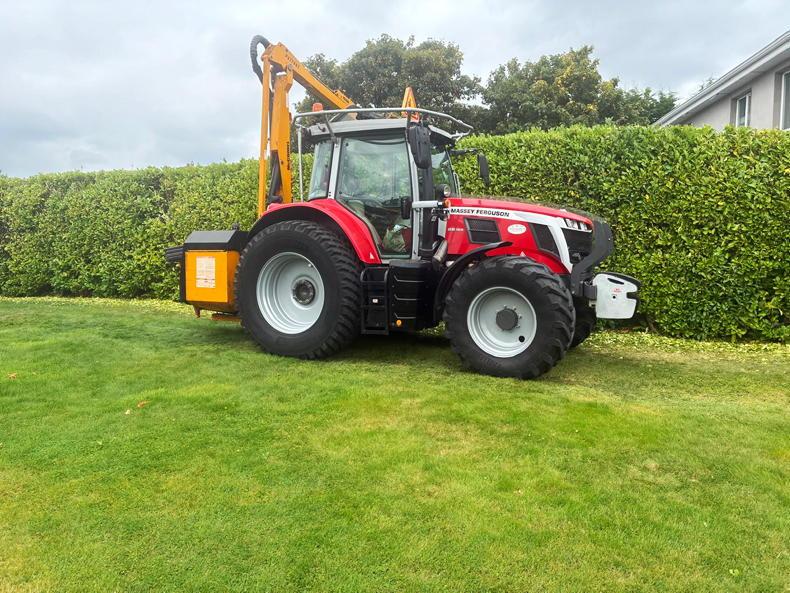
SHARING OPTIONS